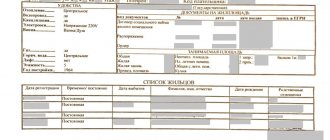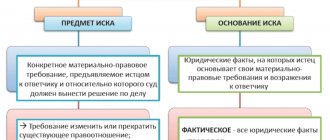Registration at the place of residence (propiska) is established by law to make it easier for government agencies to control the number of residents in populated areas. Therefore, even a small child must have a registration. Without it, parents will not be able to enroll him in kindergarten, school, receive benefits, payments and products from the dairy kitchen.
I would like to clarify right away that the concept of “registration” is a relic of Soviet times. There is no such term in Russian legislation, but in practice it is widely used. Therefore, it will be used further in the text.
So, in our article we will look at the specifics of registering a child after a divorce and how to register children without the consent of the father.
Peculiarities of registration of children in case of divorce of parents
If the child’s mother and father file for divorce, they must determine with whom the children will live:
- If they come to a common opinion, then the agreement on the residence of the children must be attached to the divorce claim.
- If they have not reached a common decision, then one of them can file an application with the court to determine the child’s place of residence or the order of communication with him.
Most often, the courts determine the place of residence of the child with his mother. That is, the child must be registered at the place of registration.
To change registration, a child can only be discharged together with a parent. If he was registered with his father, then they will have to be deregistered together.
Note! Children are not discharged “to nowhere.” The parent must provide the child's new registered address.
In an agreement or in a claim to determine the order of communication, you can indicate the condition that the child’s registration can be changed only with the consent of the father.
As soon as the court decision comes into force, this clause will become mandatory. If the mother does not comply with it, then she is considered to be violating the parental rights of the father. In this case, he can go to court and ask to determine the child’s place of residence with him.
Misconceptions about registering a child when parents divorce
The issue of registering children at their place of residence has become surrounded by a number of myths. I propose to consider the most popular of them:
- The mother and father must give consent for discharge. It is not true. If the parents did not provide for such a condition during the divorce, then the child can be discharged together with one of the parents. Moreover, when registering a child, even the presence of a second parent is not required.
- To be discharged, you must obtain the consent of the guardianship department. This is also not true. The guardianship department agrees to deregister children who are under guardianship or in a foster family. A mother or father can discharge a natural child without the consent of the guardian.
- If parents sell the apartment in which the child is registered, then they are obliged to provide him with other housing that is no worse or better. And that's not true. If the child does not own the apartment, then the parents can sell their home and buy a smaller one or a cheaper one.
General rules for registering a child
Until the child has reached the age of 14, his place of residence is considered to be the place of registration of the mother or father (Article 20 of the Civil Code of the Russian Federation). Therefore, one of the parents must register the child at their place of registration.
In this matter, the law does not establish the priority of the mother or father. Any of them can register a child.
But a parent can register children at their place of residence if it is included in the birth record. If a child was born out of wedlock and paternity has not been established, then the father cannot register him with him.
Registration must be done within 7 days. If the family has moved to a new place of residence, then the period is calculated from the moment of arrival at the destination.
The law does not establish special deadlines for the registration of newborns. Therefore, the mother or father must register it within 7 days from the date of birth registration.
If the parents did not register the child in a timely manner, then when contacting the passport office, the specialist will issue a fine in the amount of 2,000 to 3,000 rubles. (Article 19.15.2 of the Code of Administrative Offenses of the Russian Federation).
Previously, a registration stamp was placed on a child’s birth certificate. In 2021, registration is confirmed by a certificate of registration of the child at the place of residence. It is drawn up in accordance with Form No. 8 of Order No. 984 of the Ministry of Internal Affairs of Russia dated December 31, 2017.
How to register a child aged 0 to 14 years in an apartment
As has already been said, the child cannot be discharged “to nowhere.” Therefore, the best option would be simultaneous registration and discharge. To do this, you need to contact the department of the Ministry of Internal Affairs at the place of new registration.
Parents do not need to obtain the consent of the apartment owner to register their child.
If the mother and father were not married at the time of the child’s birth, then the child can be registered in the father’s apartment only together with the mother.
Note! It will not be possible to obtain a child’s registration on the same day.
Algorithm for registering a child:
- Gather your documents.
- Complete the application.
- Visit the Migration Service office of the Ministry of Internal Affairs.
- Receive a certificate of registration.
Let's look at each stage in more detail.
Collect documents
Clauses 48, 50 of the Order of the Ministry of Internal Affairs of Russia dated December 31, 2017 No. 984 establish an exhaustive list of documents for registration:
- statement from mother or father;
- birth certificate;
- passport of the applicant parent.
Documents must be provided in originals. The passport office specialists will not accept copies.
Fill out the application
You can fill out the application:
- In person at the passport office. The Ministry of Internal Affairs website will help you find a department. During the visit, the specialist will issue an application form in Form No. 6, established by Order of the Ministry of Internal Affairs of Russia dated December 31, 2017 No. 984. The parent who fills out the application for the child must indicate his data and passport details. The application is considered within 7 days.
- Through State Services. When submitting an application, the service itself will insert the parent’s data from the profile. If the children's data is entered into the profile, then the parent will be able to substitute them himself. After which the application will be generated and all you have to do is click on the “Submit Application” button. Your profile must have a verified phone number and email address. The application is considered within 8 days.
- Through MFC. To submit an application, you need to contact any branch of the MFC in the city where registration is processed. The application is processed within 8-9 days.
Visit the Ministry of Internal Affairs
On the appointed day, the applicant must visit the Ministry of Internal Affairs office or the passport office. You must have a receipt with you.
If the application was submitted through State Services, the service will notify the applicant about the day the documents will be received.
Receive a certificate of registration
When registering a child at the place of residence, parents are given a separate document. A registration stamp is not placed on the parents’ passports or on the child’s birth certificate.
If parents lose their child's registration certificate, they can obtain a duplicate. To do this, you need to personally contact the passport office with an application. You need to have your passport and child’s birth certificate with you.
The new certificate will have the details of the lost one. But the form will have a “Duplicate” stamp in the corner.
Where to start, where to turn?
If you are registering a newborn, you must first obtain a birth certificate, since without it you will not be able to proceed with the registration procedure.
In other cases, you can immediately begin registration by checking the collected papers for compliance with the requirements.
Where is it issued? The Federal Migration Service was replaced by a new body, the Main Directorate for Migration Issues of the Ministry of Internal Affairs of Russia .
This body today functions within the structure of the Ministry of Internal Affairs, and does not exist separately. This happened in April 2021 by decree of the President of Russia in connection with the improvement of the work of government bodies.
How to register a child aged 14 to 18 years
If the child has reached 14 years of age, the registration situation changes. From the age of 14 he himself must:
- be present at the passport office;
- fill out an application;
- pick up documents.
And in order to apply for registration through State Services, the personal account must be registered in the name of the child.
But he retains the right to registration in the residential premises in which one of the parents is registered. And the consent of the homeowner is not required for this.
Separately, it is worth considering the situation when a child over the age of 16 has undergone the emancipation procedure. This is the acquisition of civil rights and responsibilities in full, on an equal basis with adult citizens. a child aged 16 to 18 years can undergo the emancipation procedure if he works under an employment contract, carries out entrepreneurial activities or is married.
To be recognized as emancipated with the consent of the parents, the child must contact the guardianship department at the place of permanent registration. And if the mother and father are against it, then to the district court at the place of registration.
Although after emancipation the child receives the full range of civil rights and responsibilities, he retains his right to register with his parent. Since the passport office does not add information about emancipation, there will be no problems with registration.
An emancipated child can be discharged from the apartment without the consent of the parents and without their participation in the procedure. To do this, he must provide the passport office with an order from the guardianship department or a court decision on emancipation.
What is the procedure?
Registering a child with his mother is a simple procedure from a legal point of view; you should pick up the required papers and visit during reception hours the official whose responsibilities are to check the documents and accompany them.
The mother must write an application requesting that the child, her son or daughter be registered at her address.
The application form is standard, of an established form, it is usually issued by institutions, this is the so-called f. No. 6.
Find out whether the consent of the owner of the residential premises will be required for the registration of a minor, as well as how to remove a minor from registration at the place of residence in order to register him at another address.
Legal issues
How to change a child's registration after a divorce?
During a divorce, there is a situation where the child and his mother are registered with the father, but the man demands his ex-wife to leave the apartment.
If a woman agrees to change her place of registration and move out with her child, then she needs to: - decide where the new registration will be; — deregister mother and child at the same time; — register and register the child no later than 7 days from the date of deregistration.
If the child remains to live with his father, then there is no need to remove him from the register.
Do I need to confirm my child’s citizenship when changing registration?
When registering a child, the passport office may request citizenship documents.
This confirmation depends on the age of the child. Previously, the passport office issued a special form that confirmed citizenship. Then they put a mark on the birth certificate. Currently, such marks are not provided. If the birth certificate indicates that the parents are citizens of the Russian Federation, then additional confirmation of citizenship is not needed.
If the child has reached 14 years of age, then his citizenship is confirmed by a passport.
How to obtain temporary registration of a child when parents divorce?
To obtain temporary registration for a child, you do not need to obtain the consent of the second parent.
Therefore, the parent with whom the child lives has no choice but to submit his documents for temporary registration. Note! Registration of temporary registration does not entail a change in registration at the place of residence.
What are the benefits of registering a child in the father’s apartment after a divorce?
Consider the situation: mother and father divorced.
They decided that the child would live with his mother. But after the divorce, the child remained registered in his father’s apartment. I would like to clarify right away that this does not mean that registration is not synonymous with property rights. The child has no rights to the apartment.
He simply retains the right to reside in it. But the child retains the right to live in the father’s apartment even if he is registered in another place.
What does registering a child in the father’s apartment provide:
— parents can put their child on the waiting list for a municipal kindergarten at the place of registration; — parents can get a place in the school at their place of registration; - only the father can apply for benefits and allowances for the child.
Does the mother have the right to live at the place of registration of the child after a divorce?
This question cannot be answered unambiguously.
Let's consider the options: 1. The children are registered with their father and live with him. In this case, the mother cannot move into the apartment without the consent of the owner. 2. The children are registered with their father, and the apartment is municipal. In this situation, the consent of the father of the children to move in is not enough. It is necessary to obtain consent from all citizens who are registered in this apartment, even if they do not actually live in it. In addition, the consent of the municipality must be obtained. 3. The child is the owner of the apartment in which he is registered. In this case, the mother has the right to move into the apartment to live with the child. To do this, parents must decide that the children remain with the mother. And if agreement on this issue is not reached, the mother can move in only on the basis of a court decision.
Is it possible to register a child under 14 years of age with their grandmother?
A child under 14 years of age can only be registered with a grandmother or any other place together with one of the parents. Even if the grandmother fully agrees that her grandson will be registered with her, the passport office will refuse registration.
Is the consent or permission of the father necessary for the child to register with the mother after a divorce?
If the parents or the court determine that the children live with their mother, then additional consent is not required.
If one of the owners is against
Often from practice you can see how when spouses divorce and try to register children, fathers do not give their permission to this procedure. In connection with these events, many are interested in the question of whether the consent of one of the owners is necessary for the registration of a newborn? According to the law, you can register your child on the territory of your parents without the consent of the owner of the property.
The resolution is supported by the following laws:
- The Civil Code of the Russian Federation, which states that the baby is obliged to live on the territory of his parents. If the spouses are divorced, then the children live with one of the legal representatives.
- The Housing Code of the Russian Federation gives the right to register young children without the intervention of the owner of the property.
- The Criminal Code of the Russian Federation provides for punishment in the form of imprisonment for invalid registration.
- The Code of Administrative Offenses provides for fines for failure to obtain registration within the specified time frame.
As we have already found out, registration of a minor child without the consent of the owner is possible, but you need to decide on the grounds. There are only two of them:
- Declaratory order.
- Place of attachment.
You will also need to collect all the necessary documentation in advance in order to quickly and easily register a new tenant. It is also possible for a mother to register with her child without the consent of the owner.








